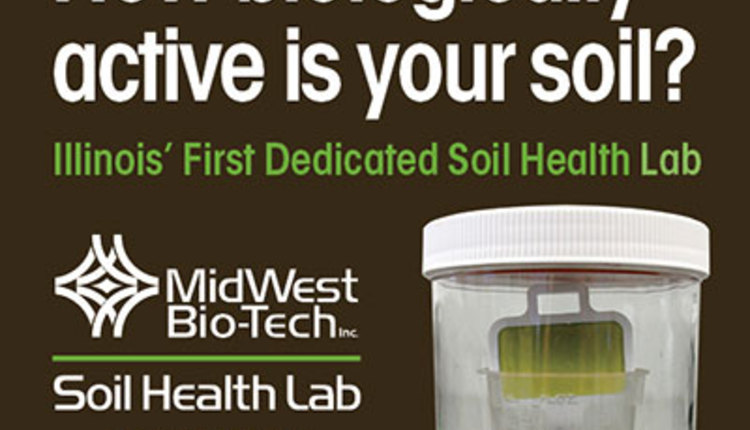Illinois’ First Dedicated Soil Health Lab Gives Farmers Fast Results Close to Home |
|
|
Biological activity tests quickly provide farmers usable information for critical crop decisionsThis item has been supplied by a forage marketer and has not been edited, verified or endorsed by Hay & Forage Grower. Midwest farmers now have a resource nearby to provide soil biology assessments quickly and accurately. Midwest Bio-Tech recently opened Illinois’ first dedicated soil health lab. “We can assess soil health and measure biological activity – two critical indicators of potential crop productivity,” says Doug Miller, vice president. “These tests provide a direct measure of microbial activity in the soil, where in the past farmers have only had access to indirect measures and couldn’t see biological changes that impact soil structure, nutrient uptake, and yield.” The Midwest Bio-Tech Soil Health Lab offers tests for carbon dioxide respiration, amino-nitrogen, and soil aggregate stability. These tests and more can be performed quickly so that the results can be returned in just a few days. The Soil Health Lab is an approved partner lab for Woods End Laboratories, originators of the Solvita test for soil respiration. Why would a farmer or landowner want to do these tests? The soil health tests provide information that complements the fertility and soil chemistry results reported in traditional soil tests. By learning about the biological aspects of the soil, farmers can potentially save production costs by making informed decisions on nutrients and other inputs that impact yield. “For example, we have worked with several customers who used this information to adjust their side-dressing and foliar fertility programs,” says Miller. “Our tests provide actionable data for farmers in a matter of days.”Miller notes that Midwest Bio-Tech started using soil health tests four years ago to measure the impact of the Chandler Crop Products that the company markets. “However, we have also used these tests to measure the impact of other farming practices that can affect soil health,” Miller explains. “Last year, we helped individual customers evaluate different tillage programs and cover crop mixes.”
The recommended frequency of soil health testing depends on the farmer and their operation. Miller explains that some farmers test more frequently than others, especially if they're making production adjustments such as changing tillage or incorporating cover crops Also, the number of samples to collect from each field depends on the number of distinct soil types and management zones in the field. As Miller explains, “We can learn a lot from soil samples collected from just a few sites in each field.” Tests available from the Midwest Bio-Tech Soil Health Lab include the Solvita CO2 Burst Test, Solvita Labile Amino Nitrogen (SLAN) test, Volumetric Aggregate Stability Test (VAST), soil pH, bulk density, soil organic matter, electrical conductivity and more. For more information on the Midwest Bio-Tech Soil Health Lab, call 309-659-7773, e-mail info@midwestbioman.com or visit https://www.midwestbioman.com/soil-health-lab/. For nearly 40 years, Midwest Bio-Tech has been helping farmers boost their bottom lines biologically. The company offers biological products like Chandler Soil, Biocat 1000, Foliar, Dry Seed Treat, and Organic to build healthier plants that make more efficient use of nutrients to generate higher grain and forage yields. For more information on Midwest Bio-Tech, visit www.midwestbioman.com. |
